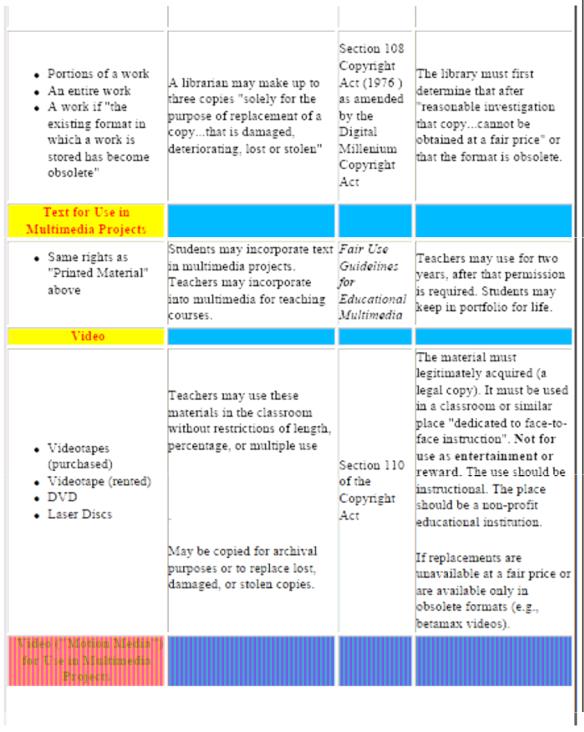
- •Table of Contents
- •How to Use this CD-Rom
- •American Values through Film: Lesson Plans for the English Teaching and American Studies
- •Letter of Thanks
- •American Values through Film Project
- •Description of Films in American Values through Film Project
- •Copyright and Fair Use Guidelines for Teachers
- •Sample Lesson Plan by Gabriel Skop, English language Fellow
- •TWELVE ANGRY MEN
- •Abakan, Katanov State University of Khakasia
- •Irkutsk State Railway Transport University
- •Krasnoyarsk State Pedagogical University
- •Omsk State University
- •Saratov State Law Academy
- •Togliatti Academy of Management
- •Bibliography for Teaching with Film
- •Internet Resources for Using Film to Teach English
Description of Films in American Values through Film Project
Source: Amazon.com film reviews |
|
|
Film |
Cultural Value/Contemporary Issue |
|
Erin Brockovich (2000) |
Role of women in citizen environmental |
|
activism |
|
|
Broke and desperate, the twice-divorced single mom Erin (Julia Roberts) bosses her way into a clerical job with attorney Ed Masry (Albert Finney), who's indebted to Erin after failing to win her traffic-injury case. Erin is soon focused on suspicious connections between a mighty power company, its abuse of toxic chromium, and the poisoned water supply of Hinkley, California, where locals have suffered a legacy of death and disease. Matching the dramatic potency of Norma Rae and Silkwood, Erin Brockovich filters cold facts through warm humanity, especially in Erin's rapport with dying victims and her relationship with George (superbly played by Aaron Eckhart), a Harley-riding neighbor who offers more devotion than Erin's ever known. Surely some of these details have been embellished for dramatic effect, but the factual basis of Erin Brockovich adds a boost of satisfaction, proving that greed, neglect, and corporate arrogance are no match against a passionate crusader.
Twelve Angry Men (1957) |
Jury system; citizen participation in rule of |
law |
|
Sidney Lumet's directorial debut remains a tense, atmospheric (though slightly manipulative and stagy) courtroom thriller, in which the viewer never sees a trial and the only action is verbal. As he does in his later corruption commentaries such as Serpico or Q & A, Lumet focuses on the lonely one-man battles of a protagonist whose ethics alienate him from the rest of jaded society. As the film opens, the seemingly open-and-shut trial of a young Puerto Rican accused of murdering his father with a knife has just concluded and the 12-man jury retires to their microscopic, sweltering quarters to decide the verdict. When the votes are counted, 11 men rule guilty, while one--played by Henry Fonda, again typecast as another liberal, truth-seeking hero--doubts the obvious. Stressing the idea of "reasonable doubt," Fonda slowly chips away at the jury, who represent a microcosm of white, male society-- exposing the prejudices and preconceptions that directly influence the other jurors' snap judgments. The tight script by Reginald Rose (based on his own teleplay) presents each juror vividly using detailed soliloquies, all which are expertly performed by the film's flawless cast. Still, it's Lumet's claustrophobic direction--all sweaty close-ups and cramped compositions within a one-room setting--that really transforms this contrived story into an explosive and compelling nail-biter.
To Kill a Mockingbird (1962) |
Racial tolerance; jury system |
Ranked 34 on the American Film Institute's list of the 100 Greatest American Films, To Kill a Mockingbird is quite simply one of the finest family-oriented dramas ever made. A beautiful and deeply affecting adaptation of the Pulitzer Prize-winning novel by Harper Lee, the film retains a timeless quality that transcends its historically dated subject matter (racism in the Depression-era South) and remains powerfully resonant in present-day America with its advocacy of tolerance, justice, integrity, and loving, responsible parenthood. It's tempting to call this an important "message" movie that should be required viewing for children and adults alike, but this riveting courtroom drama is anything but stodgy or pedantic. As Atticus Finch, the small-town Alabama lawyer and widower father of two, Gregory Peck gives one of his finest performances with his impassioned defense of a black man (Brock Peters)
10
wrongfully accused of the rape and assault of a young white woman. While his children, Scout (Mary Badham) and Jem (Philip Alford), learn the realities of racial prejudice and irrational hatred, they also learn to overcome their fear of the unknown as personified by their mysterious, mostly unseen neighbor Boo Radley (Robert Duvall, in his brilliant, almost completely nonverbal screen debut). What emerges from this evocative, exquisitely filmed drama is a pure distillation of the themes of Harper Lee's enduring novel.
Seabiscuit (2003) |
Overcoming the odds; persistence |
|
through hardship |
Proving that truth is often greater than fiction, the handsome production of Seabiscuit offers a healthy alternative to Hollywood's staple diet of mayhem. With superior production values at his disposal, writer-director Gary Ross (Pleasantville) is a bit too reverent toward Laura Hillenbrand's captivating bestseller, unnecessarily using archival material--and David McCullough's familiar PBS-styled narration--to pay Ken Burns-like tribute to Hillenbrand's acclaimed history of Seabiscuit, the knobby-kneed thoroughbred who "came from behind" in the late 1930s to win the hearts of Depression-weary Americans. That caveat aside, Ross's adaptation retains much of the horse-and-human heroism that Hillenbrand so effectively conveyed; this is a classically styled "legend" movie like The Natural, which was also heightened by a lushly sentimental Randy Newman score. Led by Tobey Maguire as Seabiscuit's hard-luck jockey, the film's first-rate cast is uniformly excellent, including William H. Macy as a wacky trackside announcer who fills this earnest film with a muchneeded spirit of fun.
All the President's Men (1976) |
Investigative journalism rooting out |
|
government corruption |
It helps to have one of history's greatest scoops as your factual inspiration, but journalism thrillers just don't get any better than All the President's Men. Dustin Hoffman and Robert Redford are perfectly matched as (respectively) Washington Post reporters Carl Bernstein and Bob Woodward, whose investigation into the Watergate scandal set the stage for President Richard Nixon's eventual resignation. Their bestselling exposé was brilliantly adapted by screenwriter William Goldman, and director Alan Pakula crafted the film into one of the most intelligent and involving of the 1970s paranoid thrillers. Featuring Jason Robards in his Oscar-winning role as Washington Post editor Ben Bradlee, All the President's Men is the film against which all other journalism movies must be measured.
Dances with Wolves
A historical drama about the relationship between a Civil War soldier and a band of Sioux Indians, Kevin Costner's directorial debut was also a surprisingly popular hit, considering its length, period setting, and often somber tone. The film opens on a particularly dark note, as melancholy Union lieutenant John W. Dunbar attempts to kill himself on a suicide mission, but instead becomes an unintentional hero. His actions lead to his reassignment to a remote post in remote South Dakota, where he encounters the Sioux. Attracted by the natural simplicity of their lifestyle, he chooses to leave his former life behind to join them, taking on the name Dances with Wolves. Soon, Dances with Wolves has become a welcome member of the tribe and fallen in love with a white woman who has been raised amongst the tribe. His peaceful existence is threatened, however, when Union soldiers arrive with designs on the Sioux land. Some detractors have criticized the film's depiction of the tribes as simplistic; such objections did not dissuade audiences or the Hollywood establishment, however, which awarded the film seven Academy Awards, including Best Picture.
11
High Noon
This Western classic stars Gary Cooper as Hadleyville marshal Will Kane, about to retire from office and go on his honeymoon with his new Quaker bride, Amy (Grace Kelly). But his happiness is short-lived when he is informed that the Miller gang, whose leader (Ian McDonald) Will had arrested, is due on the 12:00 train. Pacifist Amy urges Will to leave town and forget about the Millers, but this isn't his style; protecting Hadleyburg has always been his duty, and it remains so now. But when he asks for deputies to fend off the Millers, virtually nobody will stand by him. Chief Deputy Harvey Pell (Lloyd Bridges) covets Will's job and ex-mistress (Katy Jurado); his mentor, former lawman Martin Howe (Lon Chaney Jr.) is now arthritic and unable to wield a gun. Even Amy, who doesn't want to be around for her husband's apparently certain demise, deserts him. Meanwhile, the clocks tick off the minutes to High Noon -- the film is shot in "real time," so that its 85-minute length corresponds to the story's actual timeframe. Utterly alone, Kane walks into the center of town, steeling himself for his showdown with the murderous Millers. Considered a landmark of the "adult western," High Noon won four Academy Awards (including Best Actor for Cooper) and Best Song for the hit, "Do Not Forsake Me, O My Darling" sung by Tex Ritter. The screenplay was written by Carl Foreman, whose blacklisting was temporarily prevented by star Cooper, one of Hollywood's most virulent anti-Communists. John Wayne, another notable showbiz rightwinger and Western hero, was so appalled at the notion that a Western marshal would beg for help in a showdown that he and director Howard Hawks "answered" High Noon with Rio Bravo (1959). Hal Erickson
12

Copyright and Fair Use Guidelines for Teachers
13

14

15

16

17
